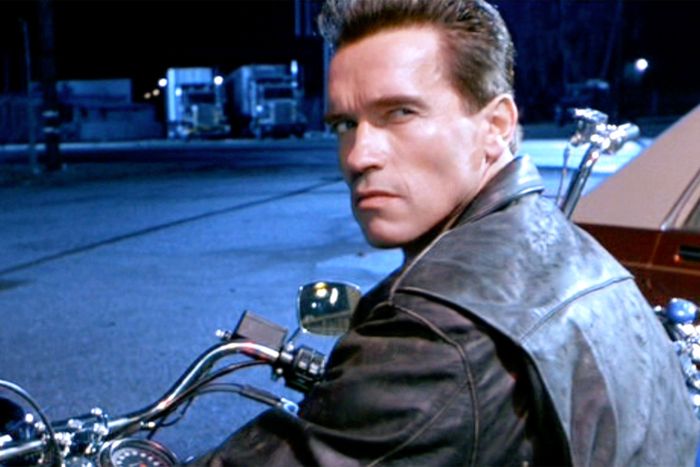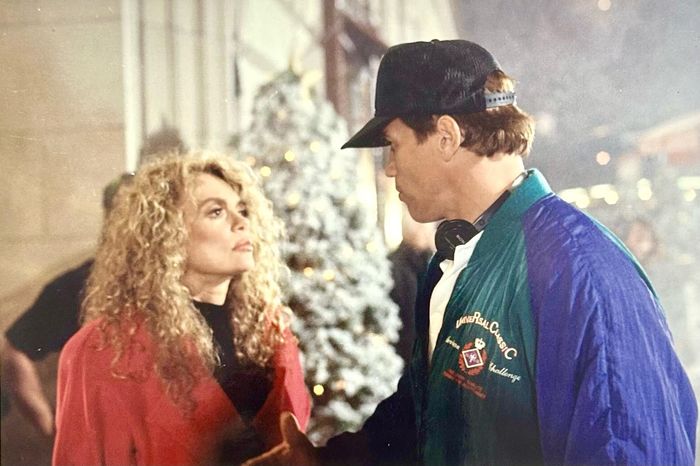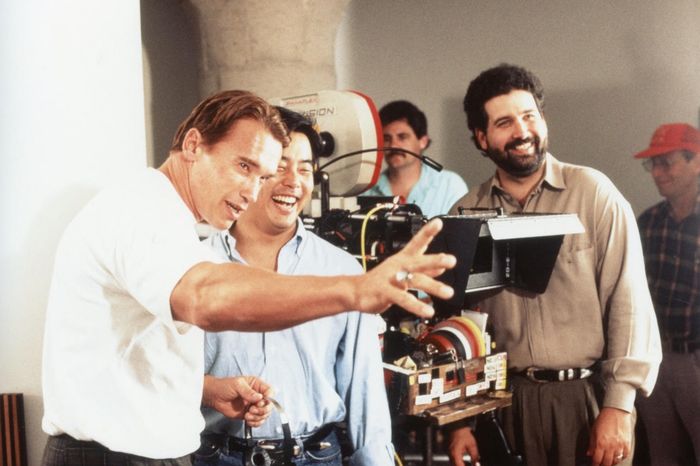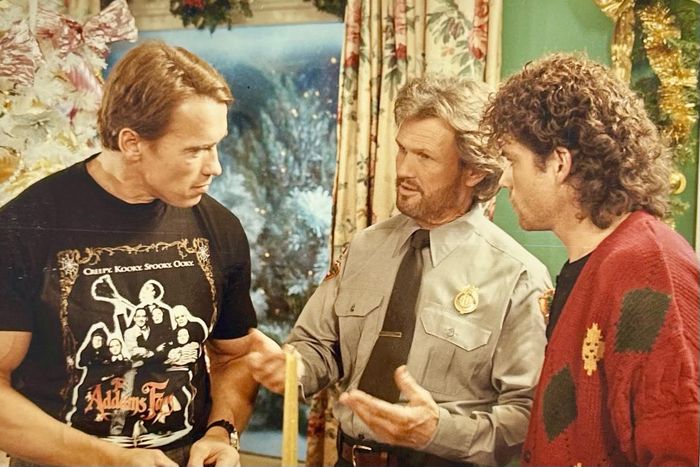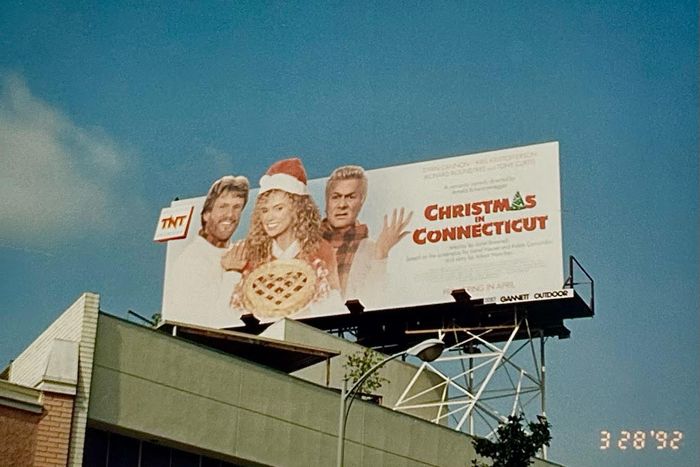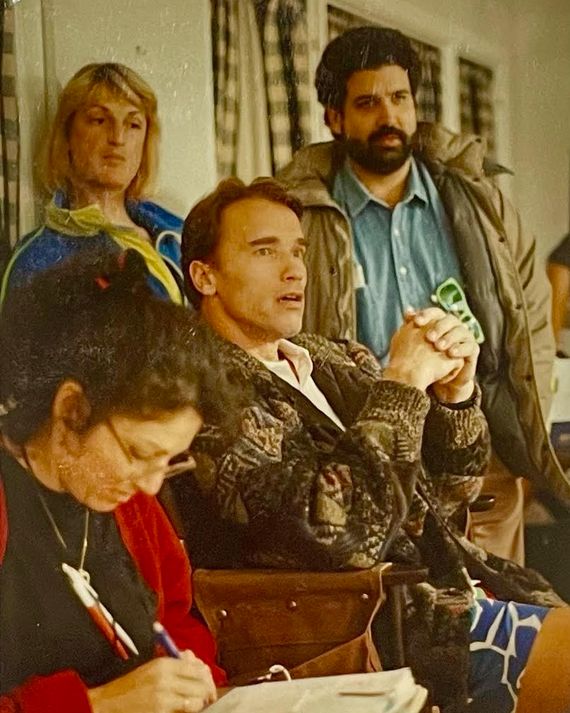
At some point between uttering the words “Hasta la vista, baby” on the set of Terminator 2 and earning half a billion dollars at the box office, Arnold Schwarzenegger decided that it was time to direct his first feature film. And so the biggest action movie star in the world wound up making the smallest Christmas film on basic cable: a remake of Christmas in Connecticut.
The original 1945 film concerns a magazine cooking columnist named Elizabeth Lane, played by Barbara Stanwyck. Her columns detail the elaborate meals she cooks for her family on their Connecticut farm. When a returning war hero wins a chance to join her for Christmas dinner, there’s just one problem: It’s all a lie. She has no family, she has no farm, and she can’t cook. High jinks ensue.
This material did not exactly call out for the Schwarzenegger treatment, but it got it in spades. In one of the all-time great Hollywood deus ex machinas, Mr. Olympia, the future governor of California, chose a feathery made-for-TV remake as his directorial feature debut. What made it to the screen is hardly a holiday classic, but the movie’s behind-the-scenes story reads like a screwball comedy with an improbable cast of characters: an outlaw country singer, Cary Grant’s ex-wife, the executive behind The West Wing, the author of Tuesdays With Morrie, the future head of Marvel Television, and the backstage stalwarts of the greatest era in televised film. Here, for the first time, is their festive tale.
I.
‘Please Hold for Arnold Schwarzenegger’
In the early 1990s, TNT was producing original made-for-TV movies to build its audience. Stanley M. Brooks, an independent film producer, had early success on the channel with a film about steroid abuse starring Josh Brolin and Mariska Hargitay. So his friend, executive Scott Sassa, gave him a shot at making another. Specifically, a remake from the MGM library, which TNT CEO Ted Turner owned. Stan chose Christmas in Connecticut, hired writer Janet Brownell to draft a script, and secured Oscar nominee Dyan Cannon (and Cary Grant’s former spouse) for the part of Elizabeth (now Blane with a B). That’s when he got a phone call from a big Hollywood agent named Lou Pitt.
Stan M. Brooks (executive producer, Christmas in Connecticut): Now understand, I’m in the television-movie business, so we don’t hear from the big, huge agents. Like, Mike Ovitz, Ron Meyer, Lou Pitt — these guys are never calling me. So if they do call me, it’s never good! It’s like, you pissed off one of their clients. So my assistant comes in and says, “Lou Pitt’s on the phone for you.” My heart starts to jump, like, Oh my God, what have I done?
He gets on the phone and he says, “Do you have a director for your Christmas in Connecticut movie?” I said, “Well, almost, yeah, we have an offer out.” He said, “Okay, well, if he doesn’t say yes, I want you to consider my client.” I go, “Okay …” I’m waiting to hear the name. He goes, “Arnold Schwarzenegger.” And I burst out laughing.
Lou Pitt (Arnold Schwarzenegger’s then-agent): Oh yeah, he was totally shocked. He said, “Is this a joke? Is this a joke?”
Brooks: “That’s hilarious, Lou. No, seriously.” He goes, “No, seriously.” I go, “What?! Arnold Schwarzenegger’s not doing a Christmas movie for TNT!” I’m thinking this, this is one of those Spy Magazine things. So I go, are they recording this? Is this Spy Magazine?
And Lou goes, “No, no, I’m serious.” He says, “Well, here’s why. He wants to direct.” Now, Arnold did have a directing credit. He had done an episode of Tales From the Crypt, which is 30 minutes. He really enjoyed it, and he was kind of tired after T2 and he said to Lou, “I would like to direct a movie.”
Pitt: The directing thing was sort of, you know, kind of out of left field.
Brooks: They said, “Well, okay, we’ll put together a big feature.” And Arnold goes, “No, no, no, no. I want low risk. If I do a terrible job, I don’t want anyone to be upset. I don’t want a big budget, and I want it to be family friendly, because I don’t want anything to be controversial. Nothing. I don’t want to take on some big social issue. I just want something very simple.”
Laurie Pozmantier (executive at TNT): My understanding was he just always loved Christmas and that he thought he would start with a television movie.
Brooks: So I told Lou Pitt, “Okay, I’ll call you if this other guy passes.” And I hang up the phone. Of course my heart’s jumping — I go, Okay, calm down. I call my friend, Scott Sassa, who runs TNT. I said, “Look, I don’t know if this is gonna happen, but there’s a small chance that Arnold Schwarzenegger may end up as the director of Christmas in Connecticut.” And he goes, “Oh my God, but that would be such a boon for TNT.”
Linda Berman (executive at TNT): At the time, Dennis Miller, who was my boss, didn’t want Arnold to direct it because he said, “He’s never directed.” And Scott Sassa, who was the head of the network, said, “Are you kidding? This is marketing gold! Arnold is going to direct this.”
Scott Sassa (president of Turner Entertainment): Half the people can’t even get our channel. The other half can’t find it! You know, it’s like, “We’re on channel 36 at Riverside and channel 42 …” So, yeah.
Brooks: The condo phone rings. I pick it up and I hear, “Stan Brooks?”
“Yes.”
“Please hold for Arnold Schwarzenegger.”
It’s like the Monday of July 4th weekend or whatever. And now — I’m serious — I can see my heart beating. And he goes, “Allo?”
“Uh … Arnold?”
“Are you the guy with this Christmas script?”
“Yes.”
“It’s fantastic. I’d love to direct it.”
“Okay!”
“But I have to shoot in Los Angeles and I have to do it in these days. And I have some notes on the script.”
“Okay.”
“Can you be here in an hour?”
“Uh, no. I’m in Colorado. I cannot be there in an hour.”
“Can you be here on Wednesday?”
“Yes! I can be there on Wednesday.”
Janet Brownell (screenwriter, Christmas in Connecticut): I’m like, okay, I truly don’t see this, but if it gets a film green light, I don’t give a shit, you know?
Brooks: This is so like a shot from beyond Pluto. No part of this is reality. These things don’t happen. Nobody calls with the biggest star in the world and says, “Hey, they want to direct your TV movie.” It just doesn’t happen!
II.
The Schwarzeneggerization Begins
Stan and Janet meet with Arnold Schwarzenegger to prepare the script for filming. Arnold does indeed have notes.
Brooks: So now I’m going to this meeting on Wednesday. I go in and he’s in his office, which is massive. I mean, it’s like, you know, the size of a football field. You’ve got to walk past all the props and stuff. And then he’s at a big, huge desk with a big, giant chair. And behind him is a bookshelf. But with all of the Mr. Universe awards, not film stuff. It’s all his bodybuilding awards. We sit down, and I remember we were going through the script, and I said, “Hey, I want to use the restroom.”
He showed me by putting up his bicep, and pointing, and he goes, “It’s that way.” I go, “Was that just to show me your bicep?” He goes, “I have to show you the guns whenever I can.” Okay, so this guy definitely has a sense of humor about himself. We go through the script. We have some notes. He wanted more humor and a little more jeopardy.
Brownell: The original film is charming. And in fairness to me, the original draft was very close, you know, it was just updated.
Brooks: Like, the Kris Kristofferson character didn’t have this big action sequence at the beginning where he rescues the kid. Arnold wanted more humor. Janet Brownell, he didn’t feel she could get there. And as it happened, my best friend in the world had written Commando, and so he and his writing partner also knew Arnold. Arnold loved them and said, “Do you think you could get your friend (who also wrote Teen Wolf) to do a comedy pass?”
Brownell: The whole thing took this, like, 180-degree turn at that point. Stan just did not want to lose him.
Jeph Loeb (screenwriter, Commando, Teen Wolf, Christmas in Connecticut; former head of Marvel Television): We walk in, and Arnold is sitting on a white couch that is literally the length of the biggest limousine you’ve ever seen in your life. And he has his feet up on this white porcelain marble table. He’s got a big cigar in his mouth and scripts all around him. He doesn’t say hello. He doesn’t introduce himself. He doesn’t do anything. The first thing out of his mouth is: “So what have you guys been doing since Commando? Clearly not going to the gym.”
So we sat and he said, “Look, you read the script, what do you think?” We gave him some ideas and he said, “Great, we start shooting in two weeks, so I need pages every day.”
Brownell: It just Schwarzeneggerized into this thing that was bigger than life.
Loeb: We didn’t make any real big structural changes. But we did a dialogue pass to find more of Arnold’s vision in terms of being a director. We were there to try to execute whatever it was that he was doing.
Now you have to understand that on Commando, he would do this all the time. He would go, “I have a great idea, listen. When the guy comes at me, I want to throw a buzzsaw at him and it chops off his arm and then I’m going to pick up his arm and punch him in his face with his own arm.” We would go, “Well, we like the buzzsaw part. Can we just do the buzzsaw part?” But he wasn’t yet a star. Now he’s Arnold, and he’s the director, and it’s Stan’s movie. So, like, our job is not to go, “Uh, maybe that’s not going to work.” Our job is to make it work.
The next day he would say, “Okay, we’re doing really well. We’re really getting there. It’s really coming to where I want it to be. So I gave it to Steven and this is what I want you to do.” I’m like, is Steven the guy at the gym? Who is Steven? As he starts to talk more, you go, he’s talking about Steven Spielberg.
Brownell: So that’s where things kind of went off the rails for me personally. Cause it’s like, okay, this is becoming a completely different thing.
Berman: It took some license with the original, but I thought it worked.
Pozmantier: It’s not how it’s done now. Whether you’re famous or not as a director, that doesn’t happen. To let somebody go and change things as much as were changed.
III.
The Infamous Hairwashing
Shooting was set to begin on November 5, 1991. With a punched-up script in hand and a budget of about $3 million, Schwarzenegger and Brooks finished casting the film. Dyan Cannon was joined by the aforementioned outlaw country singer Kris Kristofferson, a late-career Tony Curtis, and Richard Roundtree (between Shafts). Most of the shoot took place at Elizabeth Blane’s fake Connecticut home, which was shot at a house in South Pasadena. The crew assembled.
Nick Lombardo (head of physical production, TNT): When they cast it, I thought, Well, that is the weirdest cast I’ve ever heard of. I mean, the idea that these people fit together made no sense at all. Dyan Cannon and Kris Kristofferson in the same frame — it makes A Star Is Born when he’s holding Barbra Streisand look organic.
Brownell: Kris Kristofferson was sort of interesting because the first time we had a table read with him, I remember sitting at the table read going, Okay, so he’s got like four lines. But no, that’s got to be one line. I’m crossing out lines because he just cannot deliver dialogue.
Jim Wilberger (director of production at TNT, Christmas in Connecticut): We were all a little nervous about the whole thing, you know, because it’s like you’re playing with matches. “Oh yeah, let Arnold direct this!” For us, 3 million dollars was a lot of money.
Iris Grossman (Dyan Cannon’s agent): But it wasn’t like you could turn on your television and see 700 different things. So, an Arnold Schwarzenegger, Kris Kristofferson, Dyan Cannon movie on a Saturday night …
Wilberger: We get on set the first day, and I greet Arnold. He’s sitting in his director’s chair, and he has this enormous notebook. He had actually done his shot list for the entire movie already. He was doing everything he could to be as prepared as possible.
We had star trailers for Tony and for Dyan, and then of course the director. But Arnold says, “I can’t do that trailer. That’s not big enough for me.”
Brooks: Arnold’s trailer was like a house on wheels. It was literally like, you’d look at it from the outside and you’d say, “Wow.” It’s got all kinds of pop-outs and the roof went up and everything. When you got inside, it was literally like you had just walked into the Greystone Mansion.
Wilberger: It was probably almost three times as wide as a normal trailer. It was the length that became the issue. According to producer Cyrus Yavneh, Dyan comes in one morning and she goes to Cyrus and says, “Why is Arnold’s trailer bigger than my trailer?” She said, “Nobody’s supposed to have a bigger trailer than me.” So as she was complaining to Cyrus about everything else, she says, “I want Evian water piped into my sink and my trailer.”
Grossman: The infamous hairwashing.
Brooks: I’ve told this story many times. I’ve never told it on the record. I get a phone call from the hair person who says, “Look, Dyan only washes her hair in Evian. So we need the tanks in her dressing room flushed.” I call my transportation guy and I say, “Tomorrow, she’s going to want to have Evian in her trailer.” The guy says to me, “Do you know what that’s going to cost?”
Grossman: I get a call from Stan who basically says, “Okay, this is crazy, I have to put Evian in the water supply for her to wash her hair.” I had no idea what he was talking about. I said, “I don’t know what to say!”
Brownell: That sounds like utter bullshit.
Brooks: She had to have her own hair person. She was this woman with a French accent who was like a fancy hair person.
Kareen Bousier (Dyan Cannon’s French fancy hair person, via email): Bonjour Ben 🌻 What a surprise to receive your Email. To answer your question about Dyan Cannon’s hair rituals. I can assure you that I never use Evian water on her hair. That rumor was more around another actress in those days.
Brooks: The next day they get the big ten-gallon Evian bottle and I tell the transportation guy, “Okay, here’s the deal. Your driver’s picking her up? I want you with the giant bottle of Evian pouring it into the tank as she’s entering her trailer. I want her to see the bottle.” “What do you want to do tomorrow?” he asks. I said, “I want you to fill that same Evian bottle with water from a hose, and I want her to see you do that every day she comes in.”
(Representatives for Dyan Cannon did not respond to a request for an interview.)
IV.
‘Is It in Focus, Forehead?’
The Christmas in Connecticut shoot was scheduled to last 20 days. The production is shot in roughly chronological order to make it easier to keep track of continuity, so the finished film ends up reflecting Arnold’s real-time journey learning how to direct.
Pitt: Arnold’s about delegating. Walking onto a set and having to make a thousand decisions a day was not in his comfort zone. He had hired a wardrobe person who came in with fabric in different colors, and said, “How do you like this suit? How would you like this shirt?” He stopped the wardrobe mistress and said, “Are you the best in Hollywood?”
She said, “Yes.”
He said, “Well, that’s why you were hired, so you make the decision. What do you like?”
He surrounded himself with people that he trusted and allowed him to do the things that he wanted to do, which was really set the table and direct. But it wasn’t something that was going to happen down the line. He wasn’t going to become a director. He wasn’t going to be Clint Eastwood, for example.
Loeb: So, there’s Arnold’s voice just bellowing out. This is my memory — this maybe didn’t happen — but when something was really funny, he would laugh in the middle of a take. So, you’d have to do it again, because he just found it funny.
Brooks: We had a sleigh-ride scene, and we decided to take over a hangar in Culver City and build this rollicking set of hills that had a track. We put all this fake snow in and had the horses pull it on wheels.
Wilberger: The woods scene was a pretty extensive set, I must say, and it required a lot of the kind of snow that sticks longer. But I noticed when the actors started walking through the snow, it looked very foamy. There’s even one shot where you can see the wheels under the sleigh.
Berman: I remember the day I was there, they were filming that scene where chaos erupts, and the tree falls down and all that. The kid who throws up — we had to do that scene quite a number of times, because one time he just, like, threw up into the camera. We were like, “Okay, that’s too much.” And then, it wasn’t enough, and then the tree kept falling.
Loeb: Arnold thought that that was like comedy gold. “The kid should throw up in the tree.” Okay, the kid’s gonna throw up in the tree!
Berman: We should have only done, like, three takes of that. I think it was about ten.
Lombardo: It’s a little like opening a bologna factory for culture. It’s sort of like, “What’s going on in there?!” Nothing good. Nothing good.
Brooks: Nobody had any sense that, Oh my God. We’re making It’s a Wonderful Life. He did understand comedy, I will say that. So if it didn’t make all of us laugh behind the camera he would try to figure out what’s not working.
Loeb: While we’re making this little tiny movie, Arnold is in theaters with Terminator 2. And it’s doing numbers that no one has ever seen before. We were on set when it crossed $500 million. You’re standing next to the guy who’s the star of that movie and his major concern is: “Is it in focus, forehead? Let’s go.”
Berman: He called everybody foreheads for some reason. I realized as I re-watched Christmas in Connecticut that one of the cops says it in the movie, too.
Stan Brooks: That’s the pumping-iron term for somebody who’s kind of a nitwit. ’Cause I guess if you take too many steroids, you get a big forehead.
V.
Arnold’s Strike Zone
Christmas in Connecticut’s climactic scene is the Elizabeth Blane Christmas special. Everything goes awry and she finally comes clean with her audience about not knowing how to cook. On his last day working with the actors, Schwarzenegger filmed the backstage component of the sequence — a series of reaction shots of a “crazed director” watching the special disintegrate. David Arnott, who co-wrote The Last Action Hero for Schwarzenegger soon thereafter, played the part.
David Arnott (“Crazed Director” in Christmas in Connecticut, screenwriter, The Last Action Hero): It was a fantastic job for me. There was a part for a TV producer in the script and there were basically no lines for him. I think the only really scripted line was like “WHAT?!?” But there were a lot of things like, “Director reacts, director reacts.”
So, here I come at, I don’t know, two o’clock, three o’clock on the last day and we did two shots only. We did the shot from behind my head with all the cameras. That was one ten-minute take where I basically just saw everything and reacted to it. And then the second take was my close-up.
Brooks: Almost all of what Arnott does is improvised and he was fantastic.
Arnott: Arnold was very smart to do the behind-my-head coverage first, right? Because that gave me a full run at it in which the camera was not on me. And that freed me up to not worry. I knew it was just the back of my head and I knew that likely anything that I said there would probably not be used, but they were recording it for sound anyway.
Brooks: I think Arnold had been around so many incredibly hyper — I shudder to say, coked-up — members of our industry, that that performance was really in his strike zone.
Arnott: When you’re doing something like that that’s funny — it’s one giant take, and everybody on the set while you’re doing that cannot laugh, right? They have to be quiet. But you almost can hear people trying not to laugh, if that makes any sense. When he eventually went “Cut!” the room just exploded. And then they were like, “That’s a wrap!” The last shot of the whole thing was just this really happy, glorious moment.
Wilberger: By the time they were in the kitchen and they’re shooting the show, I think that we had a good rhythm going on and I think Arnold was picking better shots too.
Brooks: He’s not Arnold Schwarzenegger by accident. It’s hard work. He storyboarded every single scene, which I’ve never had a director do before or after. He did get better and better at understanding the camera and lens and actors and all the stuff. By the end, he was really on his game.
VI.
Mitch Albom’s Holiday Song
With filming wrapped, Christmas in Connecticut entered post-production. They needed, among other things, a song to play during the credits.
Brooks: We had wanted a song to go out on where Kris and Dyan were dancing. Charles Fox was our composer. We’d asked for a song from him and he had sent us a song early on, and we didn’t love it. So we’ve got to find another song. We had no money — we had no budget whatsoever. I had to think of where I could get a song from: My college roommate Mitch Albom was a songwriter.
Mitch Albom (Author, Tuesdays With Morrie; songwriter, Christmas in Connecticut): Stan calls me and says, “We need a song that’s kind of upbeat about food for Arnold Schwarzenegger’s movie. Can you do it?” I said, “Well, when do you need it by?” “Thursday.” It was Tuesday.
Brooks: No one would live with him in college because he was such a mess and he had a parrot and his room smelled. He never took a class with exams. He only took classes where he had to write papers. He would sit on the floor of his room with his legs out like a frog and a Smith-Corona electric typewriter, and he would just sit there and write a paper. Just stream of consciousness. He would write these amazing papers and he got A’s in all his classes because he could really write, but he didn’t want to be a writer. He wanted to go into music.
Mitch Albom: I just went and wrote a little song. My wife is a singer — a fantastic singer. I said, “Honey, can you sing this song? Because we don’t have time to go find anybody else.” I wrote it. She sang it. We made this tape. Apparently they played it for Schwarzenegger. He said, “I like the one with the girl.” And that’s how the song was chosen.
VII.
The Washington Premiere
The film was complete. Schwarzenegger and the crew prepared for it to air on TNT. They screened it at the Directors Guild, which was decked out like a Christmas party, with carolers, reindeers, and fully decorated trees. For reasons no one can quite explain, it premiered in April. According to the Los Angeles Times, “Martin Landau, Edwin Moses, Carl Weathers, Jeff Berg, Al Ruddy, Chris Lawford, Lou Ferrigno … Ivan Reitman (“Twins”), James Cameron (“Terminator”), [and] John Milius (“Conan”)” were there.
Brooks: First of all, TV movies don’t have screenings. If we have a screening, it’s like ten people and, you know, you rent a screening room somewhere. This was the big theater at the DGA, which holds, I don’t know, a thousand people, with a massive screen and a huge red carpet. And a press line. When I tell you that there’s never been a television movie before or since that had a press line.
Brownell: That was the screening where I ended up crying. My agent was very fast to get me a drink at that point. I just remember outside there was a kind of Christmas-themed party, and I was just like, “I need to get out of here.”
Brooks: Arnold goes, “I think we want to screen it again. That was too much fun.” I go, “Okay, I’ll see if I can organize.” “No, I want to screen it in Washington with my friend, Jack Valenti.” So now we all fly to Washington and we go to the MPAA theater. It was a who’s who of Washington. Like, both sides of the aisle. Because Maria Shriver invited her friends and Arnold invited his friends.
Sassa: The Commerce Committee, the FCC, the FTC were really important in our lives from cable. It was a great lobbying opportunity.
Wilberger: At the wrap party, we got a sweatshirt, which said Christmas in Connecticut on the front, and on the back was a picture of Arnold with a Santa hat on, wearing sunglasses, and saying something about — I can’t remember the full thing, but he used the word “you forehead!”
The film premiered on TNT on April 13, 1992. It received mixed reviews but is beloved by some, namely Schwarzenegger. “I’m ecstatic — happy is not the right word — I’m absolutely ecstatic about their performances,” he enthused to the Washington Post at the time. The press records show that Christmas in Connecticut was a media curiosity, reported on far more than the average TV movie. “He just does,” Shriver reflected to the Los Angeles Times. “He’s a big one on ‘don’t think about it or talk about it — do it.’”
Nevertheless, Christmas in Connecticut would be Schwarzenegger’s last outing as a director. The winter before he shot the movie, he was celebrating the season by tobogganing with President George H. W. Bush at Camp David, which was a good indication of where his interests and abilities were actually leading him. A decade later, in another implausible turn, he became the 38th governor of California.
Schwarzenegger and Brooks remained friends. Brooks moved into Schwarzenegger’s office building, and when Schwarzenegger’s administration began pushing for Hollywood tax credits in an attempt to keep film production from leaving California, Brooks became a member of the California Film Commission. Later, he became its chairman. (Gavin Newsom has since tried to double the size of the credits in California.) At some point in their relationship, Schwarzenegger asked Brooks, “I don’t understand why you don’t do big features?” Brooks responded, “I didn’t get in the business to make big famous movies. I got in the business to make movies, and I get to make two or three a year. I’m happy with my life.” To which Schwarzenegger answered, “That’s fantastic.”
(Representatives for Schwarzenegger did not respond to a request for an interview.)
More From This Series
- The 14 Best Christmas Action Movies, Ranked
- Nicholas Guest Answers Every Question We Have About Christmas Vacation
- 22 Great Christmas Movies That Aren’t Christmas Movies
There inside the oven Something warm and lovin’
Friends would laugh if they knew
That it’s true I’m cookin’ for two
Let’s go to the kitchen
I got something fixin’
Appetizing and new
Here’s a clue
I’m cookin’ for two…
I was a soup for one girl
Leftovers every night
Ah, but once I tasted your kisses
I was dining by candlelight
Here’s the recipe
For all the world to see
We take some me and some you
Let it stew, we’re cookin’ for two
I love you
We’re cookin’ for two! The Washington Post reported at the time “unofficially, there are reports that [Schwarzenegger] didn’t want to wait until Christmas to get his first full-length directorial effort on the air, and leaned on the cable network by agreeing to do publicity work if it aired earlier.” According to Sassa, Schwarzenegger also wanted to go to the Cannes Film Festival in France. “He asked to have us pay for the gas to get his plane to Cannes and back. We went back and forth with intermediaries for a while. I said I would pay for half. He calls me after that and says, ‘I understand you don’t want to pay for my gas.’ And then said something like, ‘Well, do you understand what I’ve done for you?’ I said, ‘No, I fully understand. But I don’t need you to be in Cannes, you know. You want to be in Cannes for some reason, which is fine, but I don’t think it’s fair of you to ask me to pay for that.’ Then he started on this tact of like, ‘Do you really want the biggest movie star in the world to hate you while you’re starting your movie career?’ We’d just started Turner Pictures. I said, ‘Well, clearly, that is suboptimal for that to happen. But no, I’m not changing my mind.’ Finally, he said, ‘Well good, ‘cause if you did, I would’ve thought you were the biggest pussy in the world.’” Schwarzenegger’s then-wife.


